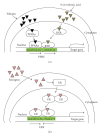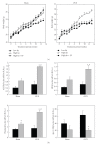PPARα in Obesity: Sex Difference and Estrogen Involvement
- PMID: 20871824
- PMCID: PMC2943125
- DOI: 10.1155/2010/584296
PPARα in Obesity: Sex Difference and Estrogen Involvement
Abstract
Peroxisome proliferator-activated receptor α (PPARα) is a member of the steroid hormone receptor superfamily and is well known to act as the molecular target for lipid-lowering drugs of the fibrate family. At the molecular level, PPARα regulates the transcription of a number of genes critical for lipid and lipoprotein metabolism. PPARα activators are further shown to reduce body weight gain and adiposity, at least in part, due to the increase of hepatic fatty acid oxidation and the decrease in levels of circulating triglycerides responsible for adipose cell hypertrophy and hyperplasia. However, these effects of the PPARα ligand fenofibrate on obesity are regulated with sexual dimorphism and seem to be influenced by the presence of functioning ovaries, suggesting the involvement of ovarian steroids in the control of obesity by PPARα. In female ovariectomized mice, 17β-estradiol inhibits the actions of fenofibrate on obesity through its suppressive effects on the expression of PPARα target genes, and these processes may be mediated by inhibiting the coactivator recruitment of PPARα. Thus, it is likely that PPARα functions on obesity may be enhanced in estrogen-deficient states.
Figures







References
-
- Issemann I, Green S. Activation of a member of the steroid hormone receptor superfamily by peroxisome proliferators. Nature. 1990;347(6294):645–650. - PubMed
-
- Beck F, Plummer S, Senior PV, Byrne S, Green S, Brammar WJ. The ontogeny of peroxisome-proliferator-activated receptor gene expression in the mouse and rat. Proceedings of the Royal Society B. 1992;247(1319):83–87. - PubMed
-
- Braissant O, Foufelle F, Scotto C, Dauça M, Wahli W. Differential expression of peroxisome proliferator-activated receptors (PPARs): tissue distribution of PPAR-α, -β, and -γ in the adult rat. Endocrinology. 1996;137(1):354–366. - PubMed
-
- Aoyama T, Peters JM, Iritani N, et al. Altered constitutive expression of fatty acid-metabolizing enzymes in mice lacking the peroxisome proliferator-activated receptor α (PPARα) Journal of Biological Chemistry. 1998;273(10):5678–5684. - PubMed
-
- Auwerx J, Schoonjans K, Fruchart J-C, Staels B. Transcriptional control of triglyceride metabolism: fibrates and fatty acids change the expression of the LPL and apo C-III genes by activating the nuclear receptor PPAR. Atherosclerosis. 1996;124, supplement:S29–S37. - PubMed
LinkOut - more resources
Full Text Sources

